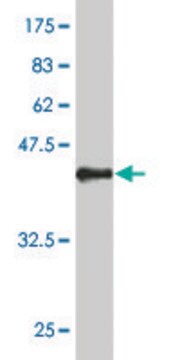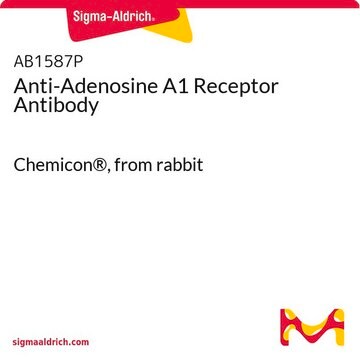AB1854
Anti-Bone Sialoprotein II Antibody
serum, Chemicon®
Synonyme(s) :
BSPII, Integrin-binding Sialoprotein
About This Item
Produits recommandés
Source biologique
rabbit
Niveau de qualité
Forme d'anticorps
serum
Type de produit anticorps
primary antibodies
Clone
polyclonal
Espèces réactives
rat, human
Fabricant/nom de marque
Chemicon®
Technique(s)
ELISA: suitable
immunocytochemistry: suitable
immunohistochemistry (formalin-fixed, paraffin-embedded sections): suitable
radioimmunoassay: suitable
western blot: suitable
Numéro d'accès NCBI
Numéro d'accès UniProt
Conditions d'expédition
wet ice
Modification post-traductionnelle de la cible
unmodified
Informations sur le gène
human ... IBSP(3381)
rat ... Ibsp(24477)
Description générale
Spécificité
Application
Immunohistochemistry (Paraffin) (see suggested protocol below)
Immunocytochemistry (1:100)
RIA
ELISA
Optimal working dilutions must be determined by the end user.
SUGGESTED STAINING PROCEDURE FOR RABBIT ANTI-BONE SIALOPROTEINAB1854
This protocol has been used successfully on 5 um, paraffin embedded sections from human fetal tibia, human fetal calvaria, human metastatic breast tumors to bone which were decalcified in 10% formic acid.
1. Dewaxing: Xylene 5 min. - Xylene 5 min. - Xylene 5 min.
2. Rehydration: 100% ethanol for 3 min. - 95% ethanol for 3 min. - 70% ethanol for 3 min.
3. Wash sections under running tap water for 5 minutes.
4. Wash sections in PBS.
5. Block endogenous peroxidase: 0.3% hydrogen peroxide in absolute methanol (2 mL of H2O2 30% in 198 mL methanol) for 30 minutes. (Cover the jar with foil, use stirring during incubation.)
6. Wash sections under running tap water for 10 minutes.
7. Mark tissue area with pap pen.
8. Cover the tissue area with 300 mL of blocking solution for 30 minutes at room temperature (blocking solution: 6 mL PBS, 0.3 gm BSA, 120 mL normal goat serum).
9. Shake off excess fluid (do not wash).
10. Incubate with primary antibody (AB1854 diluted 1:2,500 in PBS-T) at 2-8°C overnight in moist chamber.
11. Rinse with PBS-T, then wash 3 times in PBS-T each for 5 minutes at room temperature.
12. Incubate with biotinylated secondary antibody (for example Chemicon AP132B) for 30 minutes at room temperature.
13. Rinse with PBS-T, then wash in PBS-T 3 x 5 minutes at room temperature.
14. Incubate the sections with Vector ABC reagent for 30 minutes at room temperature. (ABC reagent: 2 drops of A and 2 drops of B, in 5 mL PBS, allow to stand 30 minutes at room temperature before use.)
15. Wash sections in PBS 3 x 5 minutes at room temperature.
16. Develop with DAB for 5-10 minutes.
17. Wash under running tap water.
18. Counter stain with Mayer′s HX for 45 seconds, wash in warm tap water.
19. Dehydrate: 70% ethanol - 95% ethanol - 100% ethanol, 1 min. each.
20. Wash in Xylene, mount, dry.
Forme physique
Stockage et stabilité
Informations légales
Not finding the right product?
Try our Outil de sélection de produits.
Code de la classe de stockage
10 - Combustible liquids
Classe de danger pour l'eau (WGK)
WGK 1
Point d'éclair (°F)
Not applicable
Point d'éclair (°C)
Not applicable
Certificats d'analyse (COA)
Recherchez un Certificats d'analyse (COA) en saisissant le numéro de lot du produit. Les numéros de lot figurent sur l'étiquette du produit après les mots "Lot" ou "Batch".
Déjà en possession de ce produit ?
Retrouvez la documentation relative aux produits que vous avez récemment achetés dans la Bibliothèque de documents.
Notre équipe de scientifiques dispose d'une expérience dans tous les secteurs de la recherche, notamment en sciences de la vie, science des matériaux, synthèse chimique, chromatographie, analyse et dans de nombreux autres domaines..
Contacter notre Service technique







